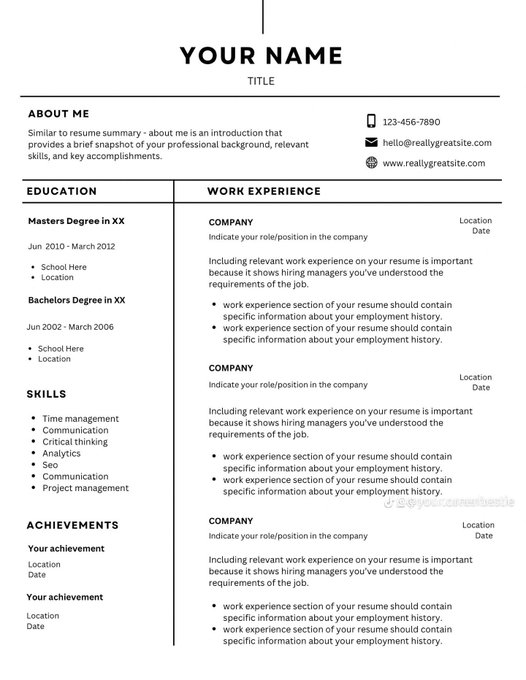A well-crafted resume is essential for making a positive impression on potential employers. It’s your first opportunity to showcase your skills, experience, and achievements, which makes it crucial to get it right. Here’s a guide to help you create an outstanding resume, using a professional template as a reference.

1. Contact Information
Start by providing your contact details at the top of your resume. This section should include:
- Your Full Name
- Professional Title
- Phone Number
- Email Address
- LinkedIn Profile or Professional Website (optional)
Ensure that your email address and phone number are up-to-date, and use a professional email address.
2. About Me
A brief “About Me” section gives a snapshot of your professional background. This introduction should highlight:
- Your key qualifications
- Relevant skills
- Main accomplishments
- Professional goals
This section is your elevator pitch, so keep it concise and impactful.
3. Education
List your educational background in reverse chronological order, starting with the most recent degree. For each entry, include:
- Degree and Major
- School’s Name
- Location
- Dates Attended
This provides the hiring manager with a quick overview of your academic qualifications.
4. Work Experience
The work experience section is one of the most important parts of your resume. Format each job entry with:
- Company Name
- Role/Position
- Location
- Dates of Employment
- Key Responsibilities and Achievements
Your descriptions should be detailed and showcase your tangible contributions and achievements. Use bullet points to keep the information organized and easy to read.
5. Skills
Include a skills section to highlight your core competencies. This section should contain both soft skills (like communication and time management) and hard skills (such as project management and analytics).
6. Achievements
An achievements section can set you apart from other candidates by showcasing your unique accomplishments. List any awards, recognitions, or major projects you’ve completed relevant to the job you’re applying for. Include:
- The Achievement
- The Issuing Organization
- Date Received
Additional Tips
- Tailor Your Resume: Customize your resume for each job application to align with the job description.
- Use Keywords: Incorporate keywords from the job description to pass through Applicant Tracking Systems (ATS).
- Keep It Concise: Aim for a one-page resume, especially if you have less than 10 years of experience.
- Professional Format: Use a clean, professional layout like the provided template for clarity and easy readability.
- Proofread: Ensure there are no spelling or grammatical errors.
By following these guidelines and using a structured template, you can create a resume that effectively showcases your skills, experience, and accomplishments, increasing your chances of landing that job interview.

